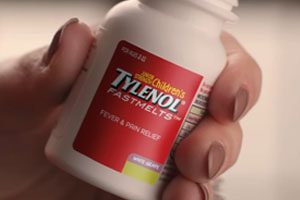
Infant Tylenol Linked To Serious Illnesses. Has your child become seriously ill after taking an over-the-counter medication made by Johnson & Johnson’s Drugs made by Johnson & Johnson’s McNeil Consumer Healthcare unit, including; Tylenol Infant Drops, Childrens Tylenol Suspensions, Children Tylenol Plus Suspensions, Motrin Infant Drops, Children’s Motrin Suspensions, Childrens Zyrtec Liquid in Bottles, […]

Infant Tylenol Linked To Serious Illnesses. Has your child become seriously ill after taking an over-the-counter medication made by Johnson & Johnson’s Drugs made by Johnson & Johnson’s McNeil Consumer Healthcare unit, including; Tylenol Infant Drops, Childrens Tylenol Suspensions, Children Tylenol Plus Suspensions, Motrin Infant Drops, Children’s Motrin Suspensions, Childrens Zyrtec Liquid in Bottles, and Children’s Benadryl Allergy Liquid, may be linked to hundreds of serious illnesses, including 30 deaths.
In April 2010, Johnson &a Johnson recalled over 40 varieties of over-the-counter children’s medications because of manufacturing issues. If your child became ill after taking any of the recalled drugs, our Johnson & Johnson defective children’s medicine lawyers want to hear from you today. You and your child may be entitled to compensation for your pain and suffering.
We are offering free lawsuit consultations to victims of Johnson & Johnson’s defective medicines.We urge you to contact our Johnson & Johnson defective children’s medicine lawyers today to protect your legal rights.
On April 30, 2010, Johnson & Johnson recalled 43 varieties of Tylenol Infant Drops, Children’s Tylenol Suspensions, Children’s Tylenol Plus Suspensions, Motrin Infant Drops, Children’s Motrin Suspensions, Children’s Zyrtec Liquid in Bottles, and Children’s Benadryl Allergy Liquid in Bottles in the U.S.and 11 other countries. At the time, the company said some drugs might contain a higher concentration of active ingredient than is specified; others may contain inactive ingredients that may not meet internal testing requirements; and others may contain tiny particles.
Johnson & Johnson sent a letter to doctors and poison control centers on May 1 that provided more information about the recall. According to the letter, some samples of recalled infants Tylenol were found to contain as much as 24 percent more active ingredient than shown on the label.
The company maintained that none of the defective drugs had reached the marketplace. The letter also said that testing of other batches that had made it to market did not find any problems. But it also warned that it couldn’t confirm that all the individual bottles were within specification or that 24% would have been the maximum.
The recall was the largest involving children’s medicines in the history of the U.S. Food Drug Administration (FDA). To put the recall in perspective, it involved 70 percent of the market for over-the-counter pediatric liquid medicines.
Despite the assurances in the May 1 letter, many children’s medications made by Johnson & Johnson have been the subject of adverse event reports to the FDA. According to a memo prepared by Democratic staff on the House Oversight and Government Reform Committee released on May 26, the FDA received 775 complaints related to use of the medications between January 2008 and April 2010. After the recall, the agency received several hundred more complaints, including seven deaths, the memo said. At the time the memo was released, the FDA was still investigating some of the adverse events to determine if the events were related to a child taking one of the recalled medicines.
Following the recall, the FDA began investigating manufacturing procedures at the Fort Washington,PA manufacturing facility where the recalled medicines were made. The agency is also investigating McNeil Consumer Healthcare’s manufacturing company wide. In addition to the Fort Washington facility, McNeil makes drugs at plants in Lancaster,PA, and Las Piedras, Puerto Rico.
An April 2010 inspection of the Fort Washington plant found more than 20 manufacturing problems, including not properly testing for contamination of the recalled products. The FDA also faulted McNeil for failing to initiate corrective action after receiving 46 consumer complaints from June 2009 to April 2010 regarding foreign materials in the drugs.
The FDA also charged that McNeil knowingly used bacteria-contaminated materials to make the recalled drugs. While FDA officials also said that none of the final product had been found to be contaminated, they cautioned that a further review of inspectors’ observations was still needed to reach a firm conclusion.
The personal injury attorneys at Parker Waichman LLP offer free, no-obligation case evaluations. For more information, fill out our online contact form or call 1-800-YOURLAWYER (1-800-968-7529).


